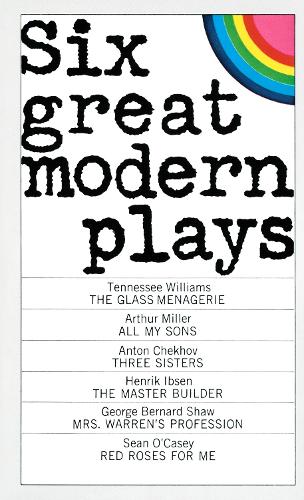
Six Great Modern Plays
(Paperback)
Publishing Details
Six Great Modern Plays
By (Author) Anton Chekhov
By (author) Tennessee Williams
By (author) Arthur Miller
By (author) Henrik Ibsen
By (author) George Bernard Shaw
Bantam Doubleday Dell Publishing Group Inc
Bantam Doubleday Dell Publishing Group
31st March 1999
United States
Classifications
General
Non Fiction
808.82
Physical Properties
Paperback
512
Width 105mm, Height 171mm, Spine 29mm
283g
Description
Here are six plays that stand as landmarks of the modern drama:
Chekhovs THREE SISTERS repeats, in terms of a handful of people, the spasms of a dying society.
Isbens THE MASTER BUILDERis the tragedy of the modern romantic, caught between desire and reality.
Shaws MRS. WARRENS PROFESSIONshocked England and America; this play was the first honest attempt in our era to deal with prostitution.
OCaseys RED ROSES FOR MEis about a Protestant worker of Dublin who is a symbol of the ravaging conflicts in Irelandand in man.
Williamss THE GLASS MENAGERIE is a tender, despairing portrait of two women, one lost in the past, the other in herself.
Millers ALL MY SONSis a biting though compassionate, indictment of success through moral betrayal.
We call these plays modern. But the they are high art, and are written with devotion to truth, and those two qualities have already made them timeless.
Author Bio
Anton Pavlovich Chekhov (18601904) was a Russian playwright and short story writer who is considered to be among the greatest writers of short fiction in history. His career as a playwright produced four classics, and his best short stories are held in high esteem by writers and critics. Along with Henrik Ibsen and August Strindberg, Chekhov is often referred to as one of the three seminal figures in the birth of early modernism in the theater. Chekhov practiced as a medical doctor throughout most of his literary career: "Medicine is my lawful wife," he once said, "and literature is my mistress."Chekhov renounced the theatre after the disastrous reception of The Seagull in 1896, but the play was revived to acclaim in 1898 by Constantin Stanislavski's Moscow Art Theatre, which subsequently also produced Chekhov'sUncle Vanyaand premiered his last two plays,Three SistersandThe Cherry Orchard. These four works present a challenge to the acting ensemble as well as to audiences, because in place of conventional action Chekhov offers a "theatre of mood" and a "submerged life in the text."Chekhov had at first written stories only for financial gain, but as his artistic ambition grew, he made formal innovations which have influenced the evolution of the modern short story. He made no apologies for the difficulties this posed to readers, insisting that the role of an artist was to ask questions, not to answer them.Anton Chekhov was the author of hundreds of short stories and several plays and is regarded by many as both the greatest Russian storyteller and the father of modern drama.
